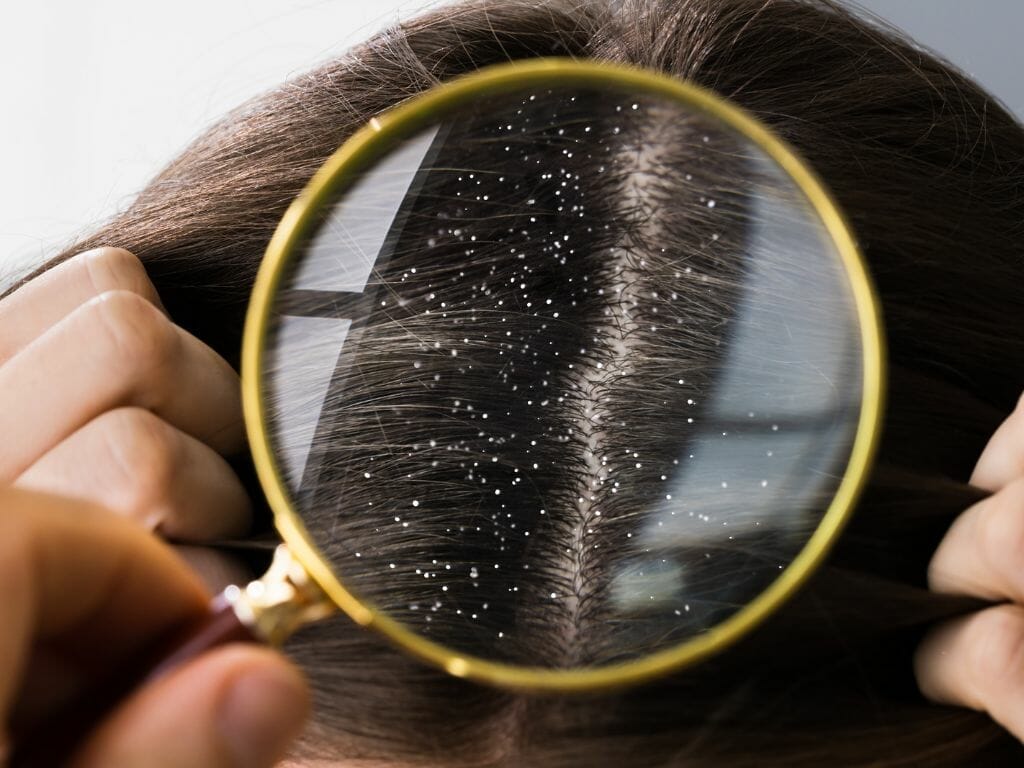5 Dandruff Facts You Didn’t Know
Hey there, buddy! You know how annoying dandruff can be, right? Well, I came across some pretty interesting information about it and thought I’d share it with you. So, get ready because I’m about to blow your mind with “5 Dandruff Facts You Didn’t Know.” These surprising tidbits will not only help you better understand this common hair issue, but they might also make you the go-to person for dandruff advice among your friends. Trust me, by the time you finish reading this, you’ll be looking at dandruff in a whole new light. Let’s dive right in, shall we?
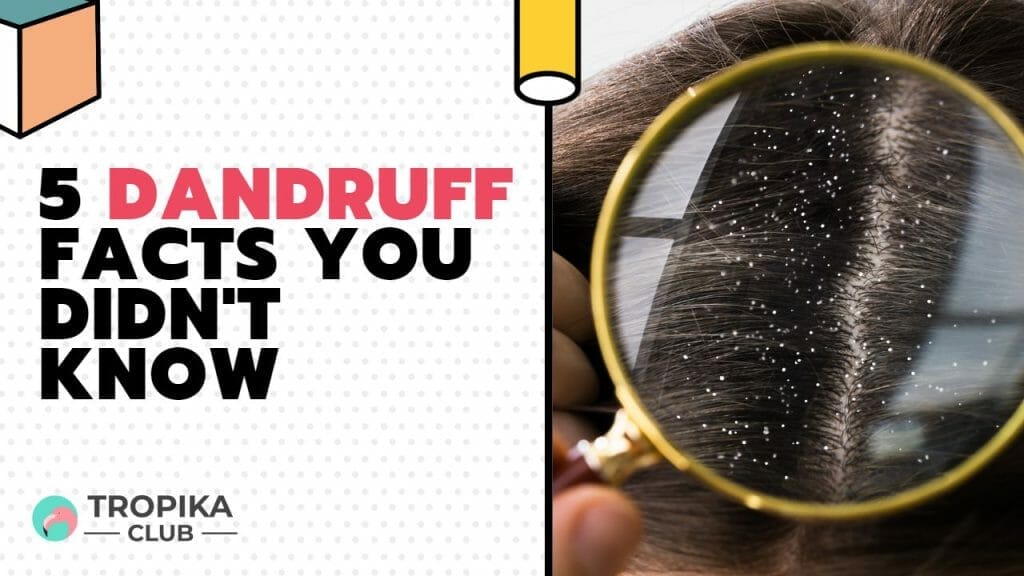
Table of Contents
- No Time to Read? Here’s a Snappy Summary of This Article
- Here are the dandruff facts you need to know:
- Fact #1: Dry scalp isn’t the only cause behind dandruff
- Fact #2: You should still wash your hair regularly when you have dandruff
- Fact #3: Exfoliating your scalp could help
- Fact #4: Oil treatments may not necessarily help with dandruff
- Fact #5: You can still use hair styling products when you have dandruff
- Meanwhile, Check Out Tropika Club’s Ecosystem of Websites
No Time to Read? Here’s a Snappy Summary of This Article
- Dry scalp is not the only cause behind dandruff. Other factors include oily scalp, fungal infections, and sensitive skin
- You should still wash your hair regularly when you have dandruff. This helps to remove the flakes and prevent yeast overgrowth. Use a shampoo with anti-dandruff ingredients like zinc pyrithione or coal tar
- Exfoliating your scalp could help with dandruff by removing dead skin cells and improving blood circulation. You can use a gentle scrub or a brush once or twice a week
- Oil treatments may not necessarily help with dandruff, as they can make your scalp more oily and prone to fungal growth. You can still use hair styling products when you have dandruff, but avoid applying them directly to your scalp or using too much.
- You don’t have to give up your favorite hair products if you have dandruff. You can still use them as long as you don’t apply them directly to your scalp or use too much. Also, wash them off at the end of the day
- Dandruff is not limited to your scalp. It can also appear on your eyebrows, ears, nose, or any other area where there is a lot of oil production. You can use the same shampoo or a mild cleanser to treat these areas
Here are the dandruff facts you need to know:
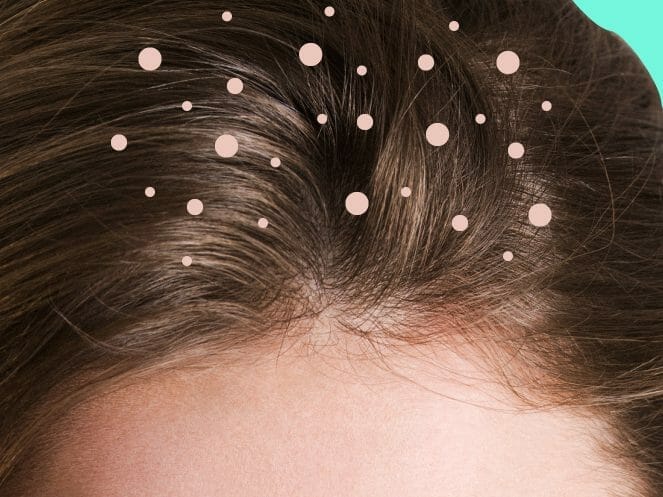
Fact #1: Dry scalp isn’t the only cause behind dandruff
Alright, listen up! I bet you thought that dry scalp is the main reason behind dandruff, huh? Well, you’re in for a surprise. While it’s true that dry scalp can cause those pesky white flakes, it’s actually not the only culprit.
- Oily Scalp: You might not have seen this coming, but an oily scalp can also cause dandruff. It’s a bit ironic, right? The excess oil produced by your scalp can sometimes lead to a yeast overgrowth, which in turn causes flaking.
- Fungal Infections: Don’t freak out, but there’s a fungus called Malassezia that naturally lives on our scalps. However, when it gets out of control, it can cause dandruff. So, it’s not always just about a dry or oily scalp!
- Sensitive Skin: Lastly, some people have sensitive skin that’s more prone to irritation. For them, using harsh hair care products might be the trigger behind dandruff.
So, there you have it! The next time you’re trying to tackle dandruff, remember that it’s not all about dryness. Keep this in mind, and you’ll be on your way to a flake-free life!
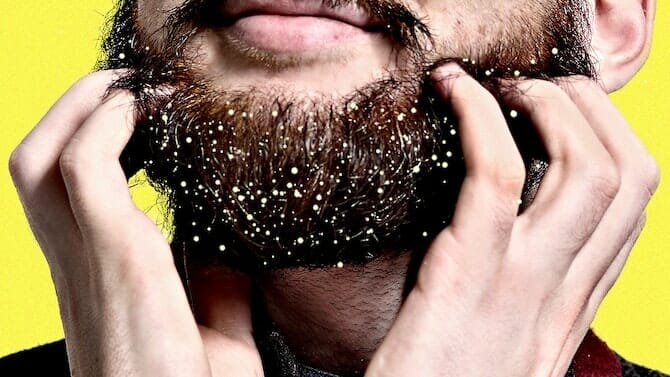
Fact #2: You should still wash your hair regularly when you have dandruff
Washing your hair less often may have worked for you time to time, but staying faithful with a daily haircare regiment could help with your dandruff woes. It softens the dandruff flakes, making it easier to wash away to make way for new skin to grow. So instead of focusing on the hair when you shower, try rubbing (not scratching) the scalp to remove the sweat, oil, and other impurities on your scalp. By the time you rinse off the shampoo, the hair shaft will be cleaned.
The right shampoo will definitely go a long way. If your dandruff stubbornly comes back, you could try a shampoo with some of these ingredients:
- Zinc pyrithione – which is antibacterial and antifungal
- Coal tar – suitable for more severe cases of dandruff, such as seborrheic dermatitis and psoriasis
- Selenium sulfide – prevents excessive shedding of dead skin cells and is an effective treatment for excessive Malassezia
- Ketoconazole – contains antifungal properties
Read Also:
Do Anti-Dandruff Shampoos Really Work?
_
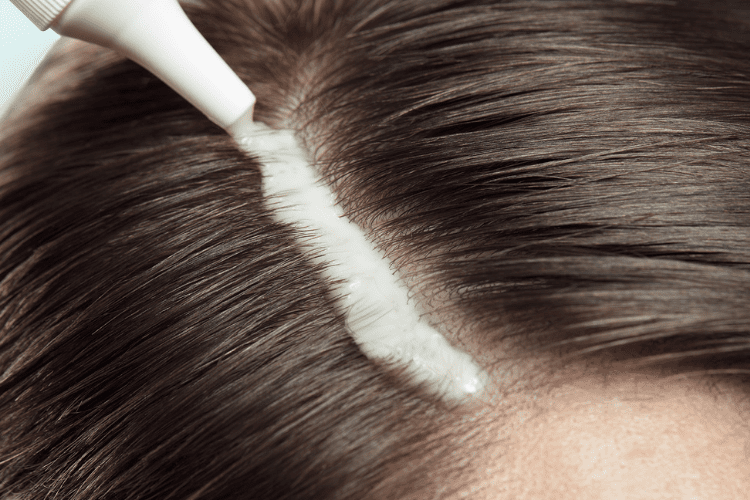
Fact #3: Exfoliating your scalp could help
Dandruff is a common problem that affects many people. It can be caused by various factors, such as dry skin, fungal infection, or sensitivity to hair products. Dandruff flakes are actually dead skin cells that accumulate on the scalp and fall off when you brush or wash your hair.
One way to deal with dandruff is to exfoliate your scalp regularly. Exfoliating is the process of removing the dead skin cells and dirt from the surface of your skin. It can help to unclog your pores, improve blood circulation, and prevent bacterial growth. Exfoliating your scalp can also make your hair look healthier and shinier.
There are different ways to exfoliate your scalp. You can use a gentle scrub, such as sugar or salt mixed with oil or honey, and massage it into your scalp with your fingertips. You can also use a shampoo that contains salicylic acid, zinc pyrithione, or coal tar, which are ingredients that can help to reduce inflammation and flaking. You can also use a brush or a comb with soft bristles to gently loosen the flakes and stimulate your scalp.
However, you should not overdo it with exfoliating your scalp. Too much exfoliation can irritate your skin and cause more dryness and itching. You should only exfoliate your scalp once or twice a week, depending on how severe your dandruff is. You should also moisturize your scalp after exfoliating with a conditioner or a serum that suits your hair type.
Exfoliating your scalp could help with dandruff, but it is not a cure-all solution. You should also consult a dermatologist if your dandruff persists or worsens despite exfoliating. They can diagnose the underlying cause of your dandruff and prescribe the best treatment for you.
So, don’t let dandruff ruin your confidence and style. Try exfoliating your scalp today and see the difference for yourself! 😊
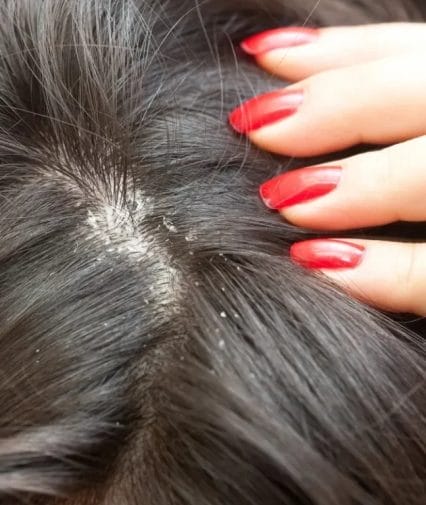
Fact #4: Oil treatments may not necessarily help with dandruff
Now, here’s something that might make you rethink your hair care routine. You’ve probably heard about the magical powers of oil treatments, right? But when it comes to dandruff, things aren’t always that simple. Surprise, surprise! Oil treatments might not be your knight in shining armor. Let me explain:
- Feeding the Yeast: Remember that Malassezia fungus I mentioned earlier? Turns out, it loves oil! So, when you slather oil on your scalp, you might actually be feeding the very thing that’s causing your dandruff. Yikes!
- Too Much of a Good Thing: Sure, oil can provide some much-needed nourishment to your hair and scalp. But, you know what they say: too much of a good thing can be bad. Overdoing it with oil treatments might lead to an excessively oily scalp, and we already know that can cause dandruff.
So, what’s the solution? It’s all about balance! Instead of drowning your scalp in oil, try using a more targeted approach. Apply the oil only to the hair shaft, or use a hair mask that focuses on nourishing the hair without overloading the scalp. By doing this, you’ll still get the benefits of oil treatments, but without the dandruff drawbacks.

Fact #5: You can still use hair styling products when you have dandruff
Who says you can’t look fabulous while tackling dandruff? Good news, fashion-forward folks: you can still use hair styling products even when dealing with those pesky flakes. But, as with all things in life, it’s essential to choose wisely and apply them correctly. Here’s the lowdown on keeping your hair game strong, dandruff or no dandruff:
- Choose Wisely: Not all styling products are created equal. Some can be harsh and might irritate your scalp, worsening your dandruff situation. Opt for gentle, non-irritating products, preferably with natural ingredients that are kinder to your scalp.
- Application Matters: Remember the golden rule: moderation is key! When using styling products, avoid applying them directly to your scalp. Instead, focus on the hair shaft and keep the product away from the roots. This way, you minimize the risk of clogging your hair follicles and triggering more dandruff.
- Wash Regularly: Let’s be honest, some styling products can build up on your hair and scalp over time. To keep things fresh and flake-free, make sure you’re washing your hair regularly with a gentle, anti-dandruff shampoo. This will help remove any residue and keep your scalp in tip-top shape.
So, go on and rock that fabulous hairstyle, dandruff be darned! Just remember to choose the right products, apply them with care, and keep your hair squeaky clean.
Conclusion
Dandruff is a common but annoying problem that can affect anyone. However, it’s not something you have to live with forever. By knowing the facts about dandruff, you can take the right steps to get rid of it and keep your scalp healthy and flake-free. The key is to use a shampoo that suits your scalp type and targets the root cause of dandruff, whether it’s dryness, oiliness, fungus, or sensitivity. You should also avoid scratching your scalp, as this can worsen the inflammation and damage your hair follicles. And don’t forget to exfoliate your scalp once in a while to remove the buildup of dead skin cells and improve blood circulation. If you follow these tips, you’ll soon notice a difference in your hair and scalp condition. And if you need more help or advice, don’t hesitate to consult a dermatologist who can diagnose your specific problem and prescribe the best treatment for you. Remember, dandruff is not a sign of poor hygiene or bad health. It’s just a natural reaction of your scalp to certain factors that you can control. So don’t let dandruff ruin your confidence or your style. With the right care and knowledge, you can say goodbye to those pesky flakes and hello to a shiny and healthy hair!

Frequently Asked Questions (FAQ)
Q: How do I know if I have dandruff or something else?
A: Dandruff is characterized by white or yellow flakes that fall off your scalp and onto your hair, shoulders, or clothes. It may also cause itching, redness, or irritation on your scalp. If you have these symptoms, you may have dandruff. However, some other scalp conditions can also cause flaking, such as psoriasis, eczema, seborrheic dermatitis, or fungal infections. To confirm your diagnosis and get the best treatment, you should consult a dermatologist or a trichologist who can examine your scalp and hair.
Q: What are the best shampoos for dandruff in Singapore?
A: There are many shampoos available in Singapore that claim to treat dandruff, but not all of them may work for you. The best shampoo for dandruff depends on your scalp type and the cause of your dandruff. Generally, you should look for shampoos that contain anti-dandruff ingredients such as zinc pyrithione, coal tar, selenium sulfide, ketoconazole, or salicylic acid. These ingredients can help reduce the inflammation, oiliness, and fungal growth that contribute to dandruff. You should also avoid shampoos that contain harsh chemicals, fragrances, or alcohol that may irritate your scalp or dry out your hair.
Q: How often should I wash my hair if I have dandruff?
A: Washing your hair regularly can help remove the excess oil and dead skin cells that feed the yeast and fungi that cause dandruff. However, washing your hair too often or too harshly can also strip your scalp and hair of natural oils and moisture, making them more prone to dryness and irritation. The optimal frequency of washing your hair depends on your hair type and lifestyle. As a general rule of thumb, you should wash your hair at least twice a week with a mild shampoo and conditioner. If you have oily hair or sweat a lot, you may need to wash your hair more often. If you have dry or curly hair, you may need to wash your hair less often.
Q: What are some natural remedies for dandruff?
A: Some natural remedies that may help with dandruff include:
- Apple cider vinegar: Dilute one part apple cider vinegar with three parts water and apply it to your scalp after shampooing. Leave it on for 15 minutes and rinse it off. Apple cider vinegar can help balance the pH of your scalp and prevent fungal growth.
- Tea tree oil: Add a few drops of tea tree oil to your shampoo or conditioner and use it as usual. Tea tree oil has anti-inflammatory and anti-fungal properties that can help soothe and treat dandruff.
- Aloe vera gel: Apply pure aloe vera gel to your scalp and leave it on for 30 minutes before washing it off. Aloe vera gel can help moisturize and heal your scalp and reduce itching and flaking.
- Coconut oil: Massage some coconut oil into your scalp and leave it on overnight. Wash it off in the morning with a mild shampoo. Coconut oil can help nourish and hydrate your scalp and hair and prevent fungal infections.

Have an Article to Suggest?
Tropika Club is always looking for new and exciting content to feature in their magazine and they value the input of our readers. If you have any noteworthy content or articles that you believe would be a great addition to Tropika Club’s magazine, we are open to suggestions and encourage you to reach out to us via email at [email protected]. By doing so, Tropika Club values your expertise and knowledge in the matter and appreciates your willingness to help. We will review your recommendations and update our list accordingly
Meanwhile, Check Out Tropika Club’s Ecosystem of Websites

Tropika Club Magazine – Tropika Club Magazine is a Singapore-based publication that features articles on a wide range of topics with a focus on local businesses and content for the region. The magazine emphasizes supporting local businesses through its #SupportLocal initiative, which includes coverage of everything from neighborhood hawker stalls to aesthetic clinics in town. In addition to highlighting local businesses, Tropika Club Magazine also covers a variety of local content, including beauty, lifestyle, places, eats, and what’s on in Singapore and the Asia Pacific region.
Tropika Club Deals – Tropika Club Deals is a leading online deals and voucher shopping site in Singapore, offering amazing discounts on beauty, wellness, and fitness products and services. It’s the perfect platform for customers who want to discover the best deals without having to commit to a specific appointment date and time. These deals are available at major beauty stores, facial salons, hair salons, and other brands in Singapore, with no minimum spend required. Choose from guaranteed discounted deals in the categories of hairstyling, hair removal, facial & aesthetics, body slimming, brows & lashes, nails & makeup, massage & spa or fitness & wellness. Tropika Club Deals is also ideal for customers who want to buy vouchers as gifts or to use for the future. So whether you’re looking to save money on your next haircut or want to treat yourself to a relaxing massage, Tropika Club Deals has got you covered with the best voucher and coupon deals in Singapore!



